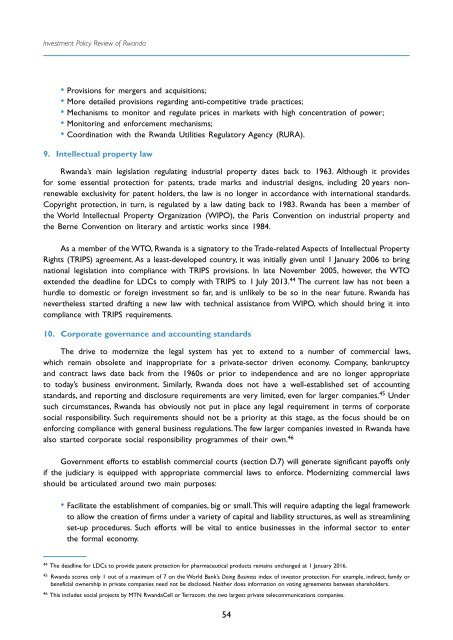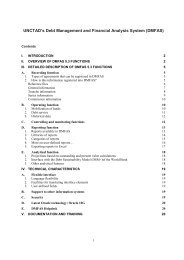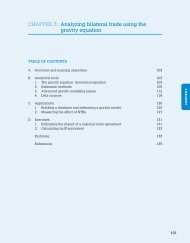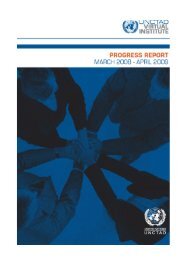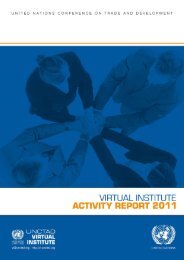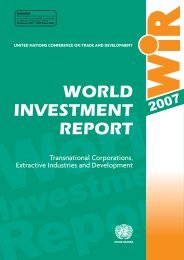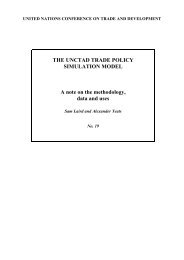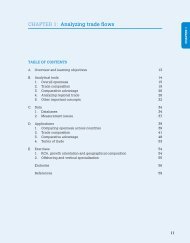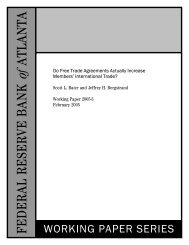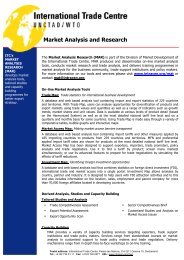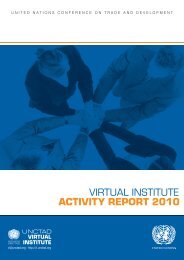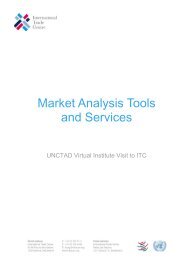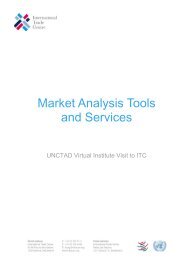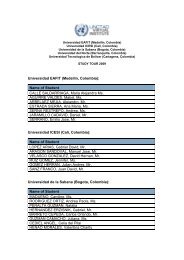Investment Policy Review - Rwanda - UNCTAD Virtual Institute
Investment Policy Review - Rwanda - UNCTAD Virtual Institute
Investment Policy Review - Rwanda - UNCTAD Virtual Institute
Create successful ePaper yourself
Turn your PDF publications into a flip-book with our unique Google optimized e-Paper software.
<strong>Investment</strong> <strong>Policy</strong> <strong>Review</strong> of <strong>Rwanda</strong><br />
•<br />
•<br />
•<br />
•<br />
•<br />
Provisions for mergers and acquisitions;<br />
More detailed provisions regarding anti-competitive trade practices;<br />
Mechanisms to monitor and regulate prices in markets with high concentration of power;<br />
Monitoring and enforcement mechanisms;<br />
Coordination with the <strong>Rwanda</strong> Utilities Regulatory Agency (RURA).<br />
9. Intellectual property law<br />
<strong>Rwanda</strong>’s main legislation regulating industrial property dates back to 1963. Although it provides<br />
for some essential protection for patents, trade marks and industrial designs, including 20 years nonrenewable<br />
exclusivity for patent holders, the law is no longer in accordance with international standards.<br />
Copyright protection, in turn, is regulated by a law dating back to 1983. <strong>Rwanda</strong> has been a member of<br />
the World Intellectual Property Organization (WIPO), the Paris Convention on industrial property and<br />
the Berne Convention on literary and artistic works since 1984.<br />
As a member of the WTO, <strong>Rwanda</strong> is a signatory to the Trade-related Aspects of Intellectual Property<br />
Rights (TRIPS) agreement. As a least-developed country, it was initially given until 1 January 2006 to bring<br />
national legislation into compliance with TRIPS provisions. In late November 2005, however, the WTO<br />
extended the deadline for LDCs to comply with TRIPS to 1 July 2013. 44 The current law has not been a<br />
hurdle to domestic or foreign investment so far, and is unlikely to be so in the near future. <strong>Rwanda</strong> has<br />
nevertheless started drafting a new law with technical assistance from WIPO, which should bring it into<br />
compliance with TRIPS requirements.<br />
10. Corporate governance and accounting standards<br />
The drive to modernize the legal system has yet to extend to a number of commercial laws,<br />
which remain obsolete and inappropriate for a private-sector driven economy. Company, bankruptcy<br />
and contract laws date back from the 1960s or prior to independence and are no longer appropriate<br />
to today’s business environment. Similarly, <strong>Rwanda</strong> does not have a well-established set of accounting<br />
standards, and reporting and disclosure requirements are very limited, even for larger companies. 45 Under<br />
such circumstances, <strong>Rwanda</strong> has obviously not put in place any legal requirement in terms of corporate<br />
social responsibility. Such requirements should not be a priority at this stage, as the focus should be on<br />
enforcing compliance with general business regulations. The few larger companies invested in <strong>Rwanda</strong> have<br />
also started corporate social responsibility programmes of their own. 46<br />
Government efforts to establish commercial courts (section D.7) will generate significant payoffs only<br />
if the judiciary is equipped with appropriate commercial laws to enforce. Modernizing commercial laws<br />
should be articulated around two main purposes:<br />
• Facilitate the establishment of companies, big or small. This will require adapting the legal framework<br />
to allow the creation of firms under a variety of capital and liability structures, as well as streamlining<br />
set-up procedures. Such efforts will be vital to entice businesses in the informal sector to enter<br />
the formal economy.<br />
44<br />
The deadline for LDCs to provide patent protection for pharmaceutical products remains unchanged at 1 January 2016.<br />
45<br />
<strong>Rwanda</strong> scores only 1 out of a maximum of 7 on the World Bank’s Doing Business index of investor protection. For example, indirect, family or<br />
beneficial ownership in private companies need not be disclosed. Neither does information on voting agreements between shareholders.<br />
46<br />
This includes social projects by MTN <strong>Rwanda</strong>Cell or Terracom, the two largest private telecommunications companies.<br />
54


